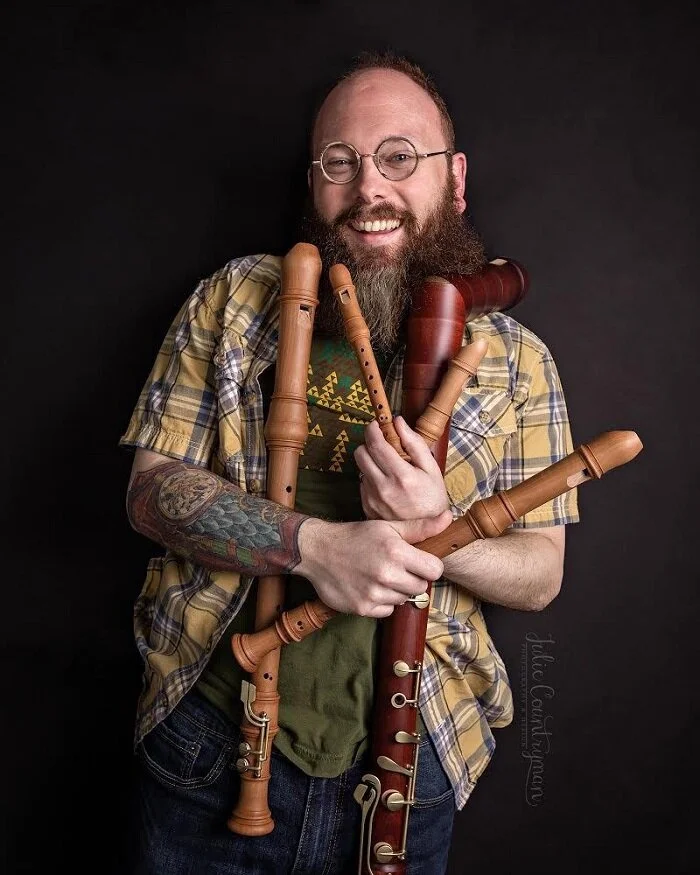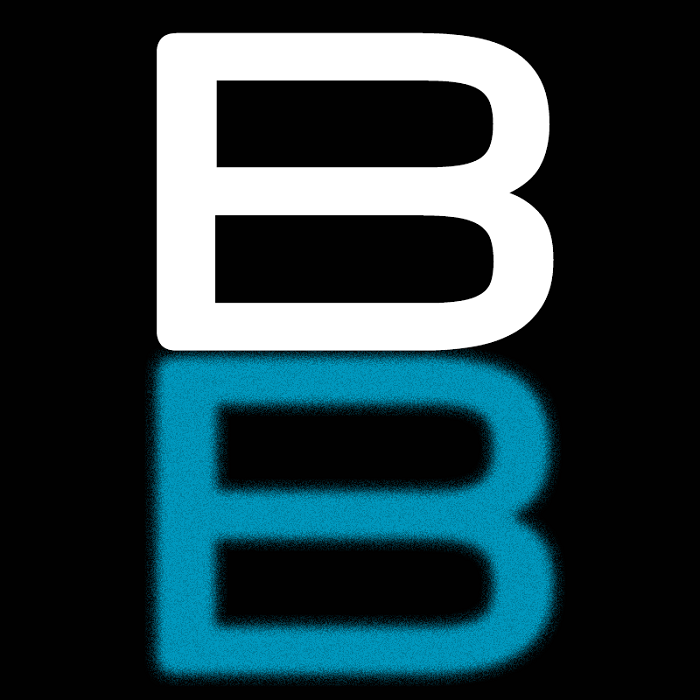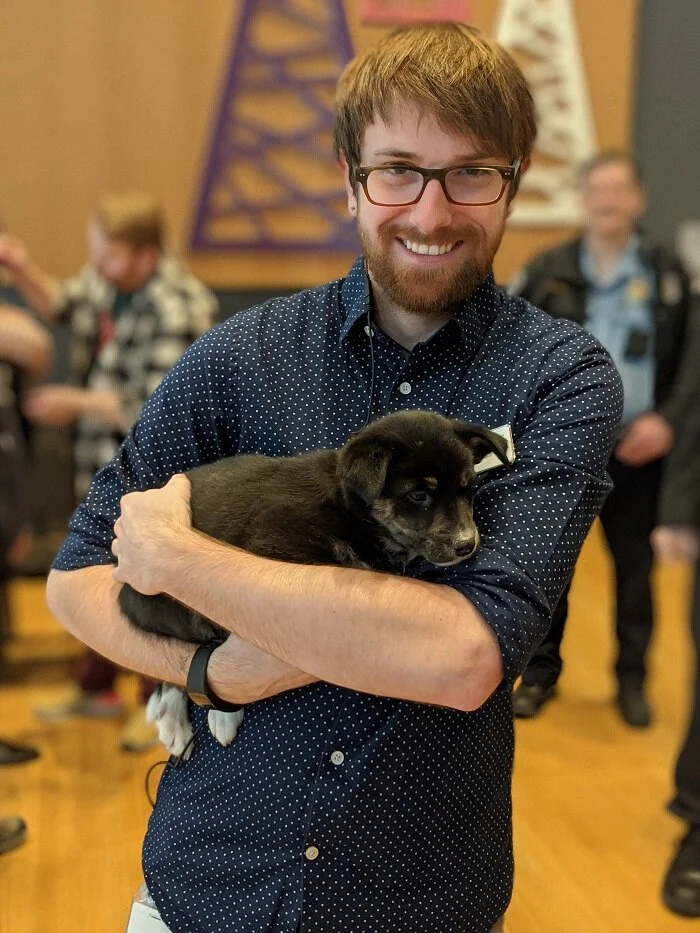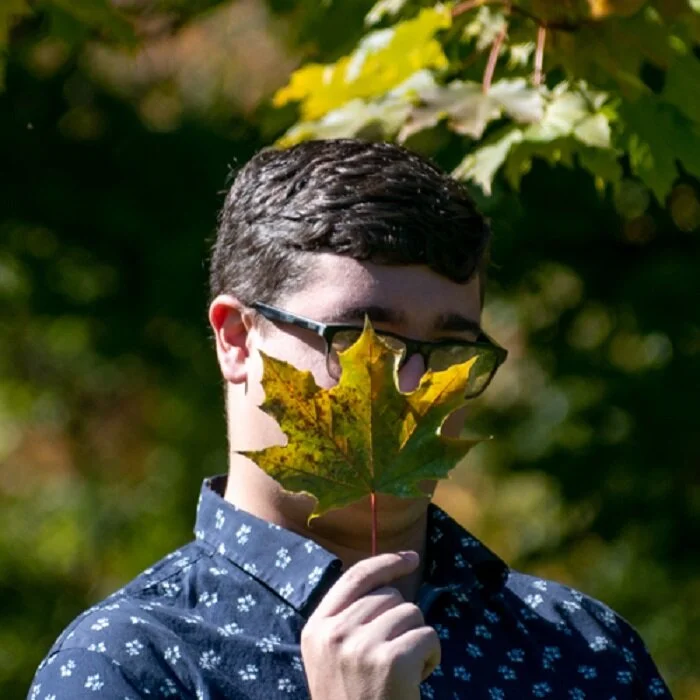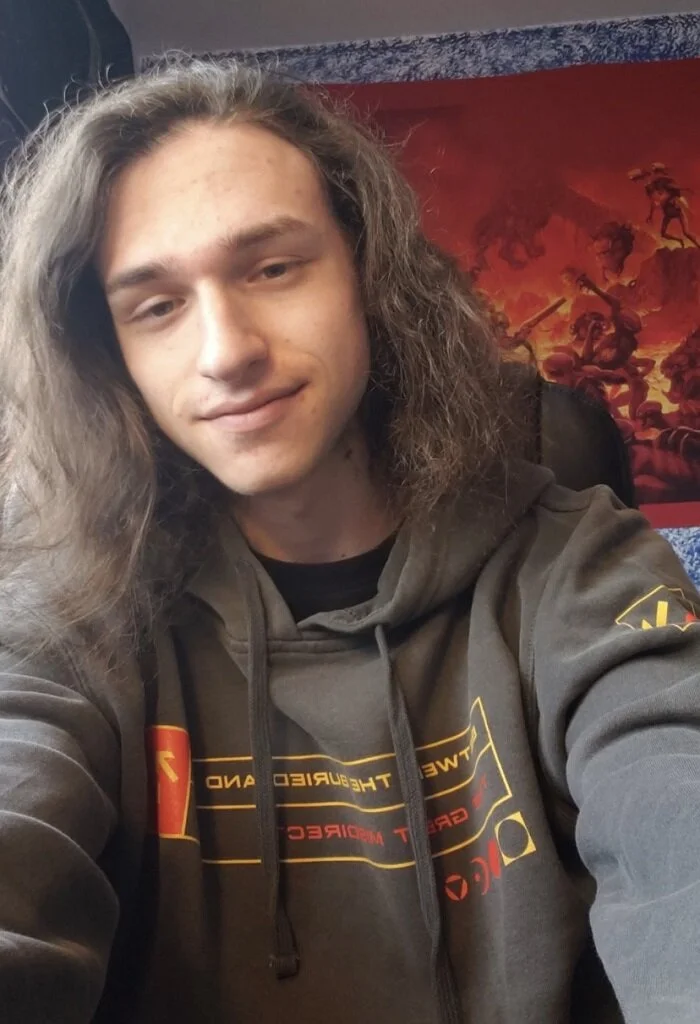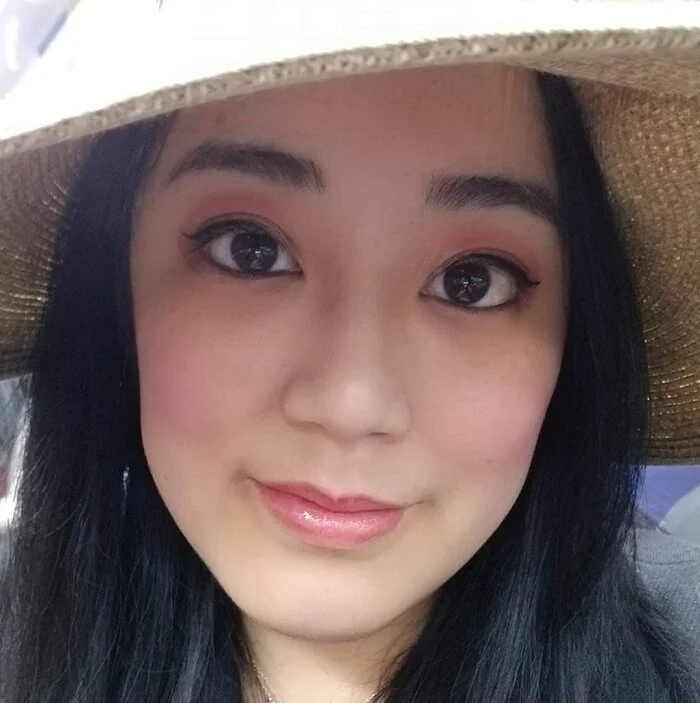Being LGBTQ in the VGM Community
For this article, I asked seven artists who identify as LGBTQ to share their experiences within the VGM community. Their responses provide valuable insight into what makes the VGM community so accepting as well as what you and I can do to make it even more inclusive.
Kain White
Kain White is a bisexual multi-instrumentalist specializing in acoustic VGM arrangements and original songs. He's contributed to VGM albums for Pixel Mixers, GameLark, and GameGrooves. In between that, he is probably playing with cats somewhere.
On the whole, do you find the VGM community to be accepting of LGBTQ individuals?
Kain White: I can only speak for the communities that I’m actively involved with, but I can say that those are all very welcoming and and accepting of all people under the LGBTQ spectrum, including supporting those who are just coming to terms with aspects of their own sexuality and offering advice and insight to help them out or even give an ear for them to vent to.
Bullicann: From what I've seen personally, the VGM community does seem to be very accepting of LGBTQ people. Very rarely have I come across a person that showed any negativity towards anyone specifically because of how they identify themselves, whether that be in VGM collectives, on YouTube channels, Twitter, etc.
Thomas Spargo: I do! All of the communities that I’ve participated in have been very welcoming to LGBTQ individuals. I think it's hard for me to fully be aware because I’m not sure that my listeners necessarily know that I’m gay. It’s not that I have intentionally hid it from them, it’s more so that my method of communication is mostly through my music.
Michelle Eng: Yes, in my experience, the VGM community has been one of the most open and accepting groups of people I know. In the video game music orchestra community, there have been countless individuals who are LGBTQ—both orchestral musicians and those in leadership roles such as conductor, president, public relations, etc.
Recorder Arcade
Jamison Forge is an active composer of music for video games, film, and live acoustic performance. As a recorder enthusiast, he uses his family of recorders from the tiny sopranino to the huge contrabass to create cover arrangements of his favorite video game music on his YouTube Channel, Recorder Arcade.
Do you have any favorite composers or cover artists who identify as LGBTQ?
Recorder Arcade: Classical: George Frideric Handel, Pyotr Ilyich Tchaikovsky, Leonard Bernstein, Jennifer Higdon, Julie Giroux.
VGM: I only know a few from personal interaction, not public forum, so out of respect, I would be hesitant to share who they are here.
Simon Kuttemplon: One of my favorite cover artists in the community is Amie Waters. They have come such a long way on their journey, and it has been wonderfully inspiring to see them grow and find themself.
Thomas Spargo: The biggest one that comes to mind is Nathan Barr. I really enjoy the music in True Blood, and I think it’s cool when composers are not only good at composing, but also perform their own music. When combined, I think there's an added layer of emotion that pulls you into the musical world they created.
Bullicann
Hi, my name is Erika, also known as Bullicann. I've been playing music for over 15 years now, including instruments such as guitar, bass, piano, violin, and alto saxophone. I've been working on doing VGM covers for the last 4 years or so, and hopefully I can keep doing music for as long as I can play my instruments!
Has video game music played a part in your personal journey when it comes to gender, sexuality, or identity?
Recorder Arcade: Absolutely! I think almost everyone goes through some sort of hardship in their life, be it emotional, environmental, etc. when coming to terms with or discovering their sexuality. My personal struggle was emotional, and my escape was video games which allowed me to go to another world, forget about all my worries, take over a persona that I wanted to be, and become a full person. This wouldn’t be possible without VGM. Music pulls you into to a world, sets the mood, and creates a new environment of emotions, thoughts, and ideas. I’ve cried over Celes’ theme, cheered at Chrono’s battle fanfare, and stopped the King of Red Lions to listen to a great track with Link on the open sea. This all helped me process my inner turmoil until I was in a place in life to face it and be true to myself.
Simon Kuttemplon: Video game music has played a huge part in my personal journey when it comes to figuring out who I am, in a subtle way. My love of games and their music brought me to several communities (RichaadEB’s, ToxicxEternity’s, Familyjules’s, Ro P’s just to name a few) where I was able to surround myself with people that were also part of the LGBTQ community. That is very fortunate because it made me feel safe to ask questions about identity since I knew I would be accepted and treated just the same as if nobody knew I was bi. That peace of mind was this incredibly helpful “eye of this storm” when the tornado of questions and self-doubt start clouding your thoughts.
Thomas Spargo: It certainly has. The coming out process is always different for everyone. Some people may know right away while some go on the heteronormative and binary path that society often naturally leads you down. For me, there was eventually a revelation that I was different. That was a hard part of my life because I started to hide a secret, creating a knowledge imbalance. The imbalance made me question the intent behind statements and comments from family, friends, and others, and it created a lot of fear in my 18 year-old self.
Video games provided an escape for me to be myself. At some point, I discovered the Japanese version of the Legend of Zelda guitar sheet music and started playing video game music on guitar. From then on, VGM has been a defining part of my life and is the driving force behind my continued passion and inspiration to play music.
Thomas Spargo
Event Organizer for VGM Con (video games and music convention), Executive Director at @gamersrhapsody, and YouTube musician.
Michelle Eng: Video game music and the community surrounding it has been such a big part of my life and an important role in my journey. I remember tabling at my university’s club fair for my video game orchestra when the president of the university’s Pride Alliance walked over to introduce himself. One of his officers said to me, “there’s a lot of LGBTQ gamers, and there is a lot of overlap between our groups.” I agreed.
During college, I met two of my best friends through my video game orchestra, who are also LGBTQ, and seeing how they dealt with being LGBTQ both gave me courage and helped me feel less alone. We were eating dinner at Chipotle one night after our orchestra rehearsal, and we were shocked to find out that we were all LGBTQ—that’s a precious memory that I’ll never forget. I’m still friends with both of them to this day. and we would have never met if I never started my video game orchestra.
One of my most poignant experiences was meeting a newcomer to my orchestra at the beginning of the school year. When I met this person, he was a loner, depressed, struggled with questioning of his sexual orientation, and even suicidal at one point. Amidst the rough, isolating world of being a pre-med student, he found the University of Maryland Gamer Symphony Orchestra, and it gave him confidence, motivation, and a sense of belonging. He eventually overcame all odds and is a successful doctor today.
The Gamer Symphony Orchestra gave him a sense of accomplishment, of importance, and most of all, belonging, which he never felt in the pre-med world. Years later, he thanked me for saving his life by becoming his friend and for the video game orchestra I created. I have never felt so moved with gratitude in my life. I want to continue this work so that others can be a part of a beautiful story, and so they don’t have to feel alone. Video game music has a very powerful unifying force and video game orchestras offer a very beautiful, transcendent experience that unites a community.
Andy-Ru
Andy-Ru is an Oregon-based composer, arranger, and multi-instrumentalist who recently started publishing his own VGM covers on YouTube. Andy-Ru spends his time working with high school bands, marching ensembles, and winter percussion groups in the Willamette Valley as an arranger, clinician, and sound designer/technician.
How do you feel about LGBTQ representation in video games?
Kain White: It's mixed. While I feel there's wonderful representation in indie games such as Gone Home, Night in the Woods, and VA-11 HALL-A, there’s another side of the coin with AAA games.
It seems that anytime a AAA game has LGBTQ characters in it such as The Last of Us, Overwatch, or Persona 5, it results in a lot of unfortunate backlash. Either over the inclusion of it or the implementation of it (in the case of P5). I'd love to see more of the larger developers strive to include representation in their games with LGBTQ writers involved to ensure that those characters are wrote in an appropriate way.
Andy-Ru: In video games, I think there is a decent level of representation compared to other forms of mainstream media. Coupled with the interactive nature of gaming, it can be a very powerful tool in regards to awareness and acceptance. It was a huge moment for me in The Elder Scrolls V: Skyrim when I realized my character could pursue a romantic relationship with characters of different genders. It enables people to feel like their sexuality (or beliefs or identities) are valid and worth considering, rather than just going through the heteronormative motions we're all used to seeing.
Simon Kuttemplon: LGBTQ representation in video games is a tricky thing. I might be in the minority, but I think when games put too much emphasis on a character being gay/trans/etc, it starts to feel like overcompensation to appeal to the community or something. In my opinion, the community is better represented when a character just happens to be gay or is implied they are trans or what have you. For example, in Borderlands: The Pre-Sequel, one of the playable characters is lesbian, but she has more to her character than that, and it’s only a small part of her lore, yet it doesn’t feel like it was shoved under the rug. I’m sure there are better examples, but that’s one that felt the most relatable because I myself don’t want to be completely defined by my sexuality. Yes, it’s a big part of who I am, but it’s not the ONLY thing I am.
Simon Kuttemplon
Active member of the VGM community support your friends.
Where do you think the VGM community could improve when it comes to LGBTQ acceptance?
Recorder Arcade: I've never hidden my sexuality, though I’ve never had a need to outright say it to the VGM community either. I’ve never run into any animosity over my sexuality in my VGM life (maybe that will change after this article!) but like I stated before, I think we’re here for a common bond of games and music, and sexuality doesn’t have to complicate that relationship.
Kain White: I would like to see a charity album done with LGBTQ members of the VGM community that raises money for different LGBTQ charities such as Mermaids, Stonewall, and Kaleidoscope Trust with at least half of the track listing being Rainbow Road covers.
Bullicann: I think we are starting to finally see a better overall representation, especially through Indie Games. I think there's a long way to go before we hit a “normalcy” with LGBTQ characters and themes, but we’re at least on a positive trend.
Thomas Spargo: Many of my conversations in the VGM community are naturally around music. That said, I don’t see it often discussed much, but that could be because we're discussing arrangements and other musical aspects. Additionally, since VGM is mostly instrumental, it allows more imagination in the music. A lyrical love song often has genders mentioned which can sometimes get in the way, but an instrumental love song relies on the pure emotion of the composition and performance to project that feeling. That universal language can be inviting to anyone.
In general, I think naturally talking about it more would be helpful especially to those who aren't out or fully out. It might give them more support to understand themselves and to let them know they are not alone. If my 18 year-old self could have talked to someone like me, I think it would have been helpful
Michelle Eng: In my personal experience, the VGM community has been very positive and inspirational. I think the best way to help is to just encourage LGBTQ people to share their stories and for allies to be visible and to let people know they are someone that LGBTQ people can talk to. Sometimes, all it takes is just one person to make a difference. I hope at least by sharing my story, I can make a difference for someone.
Michelle Eng
Michelle Eng is an orchestral innovator and musician in the video game music world. She is the founder of the University of Maryland Gamer Symphony Orchestra, YouTube artist Meowsical, and currently runs a YouTube channel teaching people how to start and run a video game orchestra, Gamer Symphony Dreams. You can follow her at @gsofounder on Twitter, her artist page @MeowsicalVGM, or Gamer Symphony Dreams at @GSODreams.


